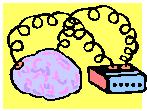Electrical Modalities, Low Back Pain & The Evidence!
Reference:Khadilkar A, Milne S, Brosseau L, Robinson V, Saginur M, Shea B, Tugwell P, Wells G. Transcutaneous electrical nerve stimulation (TENS) for chronic low-back pain. Cochrane Database Syst Rev. 2005 Jul 20;(3):CD003008.
Interferential therapy, short wave diathermy, therapeutic ultrasound, TENS and laser therapy are some of the clinically common modalities used by some clinicians to provide potential symptomatic relief for individuals with acute LBP.
With such lack of evidence supporting any of these modalities (level D), why do so many clinicians almost desperately rely and cling to them as their primary method of intervention? This is rather a difficult question to answer, but here are some hypotheses:
- Modalities allow the clinicians to attend simultaneously to other patients, especially during busy periods
- Some machines such as laser and interferential current have fancy dials, flashing lights and beeping sounds that can be quite impressive to the patient?these may inevitably sometimes have powerful placebo effects
- Some patients ‘demand’ to have passive modalities used on them, as they are just not interested in a self-management approach
- Some clinicians believe that since the use of modalities is taught at the university level and so commonly utilized, they must be effective
- Perhaps clinicians who do not have specialist manual therapy skills might feel limited to modalities as their primary interventionNow that we I have done my modality bashing, allow me to debate the potential positive aspects of the use of electrical modalities. Let’s be realistic now, clinicians rarely use a modality as their sole intervention for LBP…if they do, they should have their license revoked! If these passive modalities are used as a means of encouraging and maximizing an active approach, their application might have some justification. It may be argued that if a modality even slightly reduces the symptoms for the short-term, it may allow the patient to better perform their self-management exercises.
One of the most researched electrical modality is transcutaneous electrical nerve stimulation (TENS), which was introduced more than 30 years ago as an adjunct to the pharmacological management of pain. However, despite its widespread use, the usefulness of TENS in chronic LBP is still controversial and its effectiveness on acute LBP has not even been studied. This latest systematic review basically concluded that there is inconsistent evidence to support the use of TENS as a single treatment in the management of chronic LBP (Khadilkar et al 2005).
Therapeutic ultrasound is another one of the most widely and frequently used electrical modality, yet its effectiveness for treating people musculoskeletal injuries including LBP remains questionable and unsupported.
This systematic review concluded that there is scientific evidence (level B) that therapeutic ultrasound has no clinically important benefit for LBP (Robertson & Baker 2001). (Just so you know therapeutic ultrasound has been shown to be effective for carpal tunnel syndrome and calcific tendinitis of the shoulder)
What can we learn from the lack of studies?
The use of electrical / physical modalities is not recommended for use as a sole therapy, since their continuous use on a patient may encourage passive dependency. This psychological dependency may have far more negative consequences on some patients with LBP, which would certainly outweigh any of their hypothesized benefits.
In summary, I have nothing against the use of electrical modalities on some individuals, if they are applied in conjunction with an appropriate self-managing independent exercise program! If an electrical modality fails to immediately increase the patient?s ability to move, exercise or perform a specific functional task, then in my opinion (based on evidence), don’t waste your energy or the patient’s time. Discontinue the passive intervention before you encourage dependency …especially if they have high fear-avoidance beliefs!
Posted on: June 05, 2006Categories: Lumbar Spine , Modalities / Meds / Supplements


